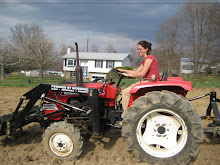Maybe one day I will write a book compiling farm start-up stories. But until then, here's a glimpse into the specifics of mine...
Land:
I am renting my land (with house) from a family friend, an opportunity which was brought to my attention by my mother while I was living down in Texas. The property is about 2 acres total, with about a half acre of cultivatable land. It's been farmed on and off for the past 70 years (at least) and has a small stream and great soil.
Money:
To pay my regular bills I have housemates and I have a part-time job; I work for the Town of Black Mountain as School Garden Educator 15-20 hours a week. Thus the farm can operate as a separate entity entirely and is not expected to support me...yet.
To finance initial startup I am offering a farm share program for the season - members pay $375 up front for 15 weeks of vegetables this summer. I currently have 5 members signed up and will accept 5 more. This money, together with $1,125 from personal savings and family support, will get me through initial startup costs to the start of the market season.
Marketing:
The farm share program is my main marketing outlet, in addition to that I am a member of Foothills Family Farms, a cooperative of small family farms and will sell at tailgate markets through them. I will also be selling to the Blue Ridge Food Ventures winter CSA.
Equipment:
It's a tight budget, and thus I live somewhat of a scavenger lifestyle. Craigslist is my best friend. Last night I rushed in to town to pick up a bathtub off the side of the road (when cleaned up it will make an excellent wash tub!). My farm van (a purple plymouth grand voyager - her name is Jean, short for Aubergine, the fastest little eggplant in the west!) is on extended loan from my aunt and uncle and is missing the driver side window (which is fine, unless it's a rainy day and I need to make a left turn). I have a walk behind tiller and various hand tools that are all second-hand aquisitions as well. I have a wheel plow on loan from my neighbor Sherman. I have a refrigerator that I got off craigslist for 25 bucks which is a story in itself. I traded future vegetables for a deep freezer. And that's pretty much it for equipment. To do large tractor work I either borrow the tractor from the Buncombe Community School (where I also rent greenhouse space) or contract with Mr. Wilson.
Labor:
Me. Friends. Family. Housemates. Neighbors. Enthusiastic Farm Share members. This summer I hope to hire someone part-time, but until then I am relying on the enthusiasm and muscle of volunteers (send me an email if you want to help out!).
Education:
Most recently and most importantly I interned for 8 months on a 20 acre organic CSA farm in Austin, Texas - Johnson's Backyard Garden. Before that I had worked on farms only recreationally, and had gardened on my own and in community gardens. I studied Environmental Studies in college, which gave me a general understanding of sustainable agriculture but did not teach me specifics and techniques, that has come through hands-on experience.
I take advantage of every conference or workshop that I can - the Southern Sustainable Agriculture Working Group conference, the Organic Growers School, the Appalachian Sustainable Agriculture Project's marketing conference for farmers. I've joined the CRAFT Farmer Training Initiative program which will feature monthly on-farm workshops for farmers. And being a member of Foothills Family Farms has introduced me to a whole new group of mentors. I visit as many farms as I possibly can and ask lots of questions, in the field and in the office. Really this farming venture is all about education - I see this as my graduate education, my field is my thesis.
Community:
Hands-down the most important piece of my business plan is the community that I live in. Having grown up in this area I benefit from a multitude of relationships which form a web of community support for my farm. It's difficult too though, accepting things from people - even necessary items that are given in love - brings with it a feeling of indebtedness and dependency. Soon I will at least have veggies to send home with volunteers, a little something to give back!
So, there's more than you ever wanted to know about my farm (can you tell it's still raining outside?).
Some recent photos...


That's the BCS tractor - I was incorporating soil ammendments. What fun! Made me feel like a *real* farmer, if only for just a moment.

Snow on Red Russian Kale

Snowy Day in the field






No comments:
Post a Comment